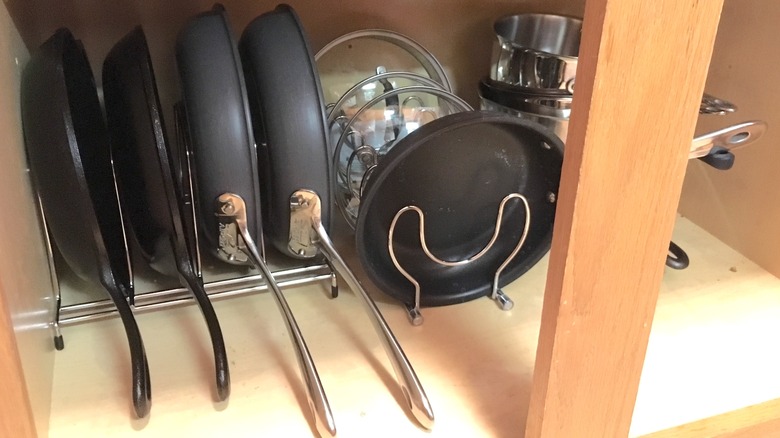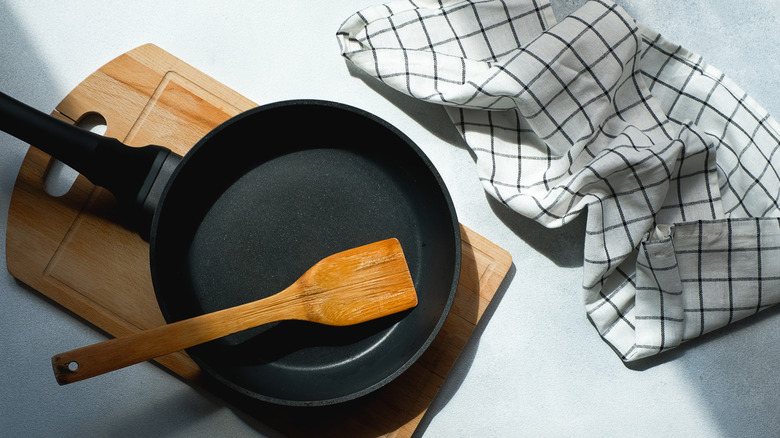The Best Way To Keep Cast Iron Seasoned Is Also The Easiest
If there's one thing everyone and their cousin will tell you about cast iron pans, it's that you've got to keep them seasoned. Seasoning cast iron cookware the first time involves rubbing it with a thin coat of oil, heating it in the oven, and repeating the process several times. Keeping the pan seasoned, however, is quite a bit easier. The Takeout spoke with two food bloggers, Sarah Hill of Real Food With Sarah and Megan Keno of Homemade Home, and they both told us that if you use your pan the right way, it'll keep itself seasoned.
According to Hill, "Regularly cooking with your cast iron is the best way to maintain its seasoning." She favors using fatty foods, suggesting bacon, sausage, or anything fried in oil. Keno agrees that repeated cooking is the best way to keep a pan seasoned, telling us, "My general rule of thumb is just to use it and the cooking will do the work for you." She went on to say, "Cast iron is one of the pieces of cookware that gets better over time."
Keno isn't entirely on board with using bacon fat, though. "Bacon was always a standard back in the day because it was a heavy oil that protected the iron from rust and created a film to keep away moisture," she said. "The downside is that if you're not using your bacon-greased pan every day, and you only use it occasionally, bacon grease will go rancid over time... Using high smoke point oils like avocado oil or canola oil is quickest and easiest to season your pan and keep it in shape."
Keeping cast iron seasoned in storage
If you're using your cast iron on a regular basis and cooking with a decent amount of fat, keeping your cast iron seasoned should be no problem at all. What if you don't tend to use it so much in summertime, though, or you're planning an extended vacation? Whatever the reason, you'll need to prep the cast iron beforehand to make sure it stays seasoned. "Before storing, rub a small amount of oil all over the surface then store it in a dry place with airflow.," Hill said. "You can slip a paper towel between stacked pans to prevent trapped moisture."
Keno also endorses applying a coat of oil before storing cast iron — she even specifies what type. "My favorite to use for all seasoning, and in particular long-term storage, is avocado oil or canola oil. These are high smoke point oils that polymerize well to create a long-term coating for your pans." Again, however, she expressed some dubiousness about bacon grease. While leftover bacon fat can be tasty for cooking, Keno warns that "things like bacon grease may become sticky or gummy over time and then you will need to clean your pans again before cooking with them."
How can you tell if your cast iron's sufficiently seasoned?
If you've stored a cast iron pan for a while, you may be wondering how to tell if it's still seasoned enough to cook with once you get it out of storage. "A properly seasoned skillet has a smooth, semi-glossy finish and food can slide around easily," says Hill.
There are a few tell-tale signs you can look for which indicate that your pan is no longer as seasoned as it ought to be. "If the pan feels sticky, has dull spots, or food starts to stick, that means it needs to be re-seasoned," Hill continued. The way Keno described it, "Visually, your cast iron pan should have no signs of rust or discoloration." If there is any rust, it'll need to come off, but removing it shouldn't be too difficult. You can remove rust from cast iron pans using distilled vinegar. Alternatively, you can use ketchup to clean rust off of cast iron. Once you give your pan a good scrub with a ball of aluminum foil and re-season it, it'll be as good as ever.


